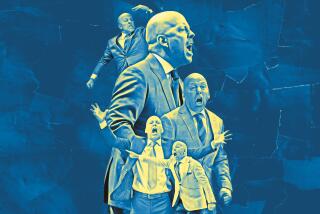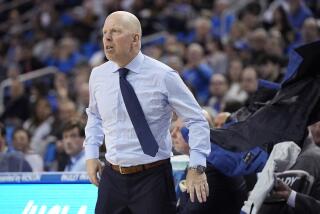Winning Ways : Desire for Success Helped Erickson Overcome Cold Reception in Miami
- Share via
CORAL GABLES, Fla. — Oh, sure, everything is wonderful now. Dennis Erickson’s No. 2-ranked Miami Hurricanes are undefeated and vectoring toward Tallahassee, where unbeaten and No. 1-rated Florida State awaits. The winner will probably play for a national championship on New Year’s Day, which, at Miami, is all anyone really cares about anyway.
This is how they think here: national championship or bust. For instance, when the Hurricanes roughed up Texas in last season’s Cotton Bowl and eventually finished third in the polls, the yawns almost drowned out the cheers on this campus.
Had Miami done that 10 years ago--won 10 games and ended the season ranked No. 3--there would have been a ticker-tape parade on Biscayne Boulevard. Instead, there was polite applause and talk of doing better the next year.
“If you lose one game here, they’ll say, ‘What’s wrong with the program?’ ” Miami quarterback Gino Torretta said.
Or as Erickson says he has come to learn: “At Florida State you can lose one, at Florida you can lose one, at most places in the country you can lose one. Seems like most people can deal with that. But here, a loss , it’s almost like the end of the world.”
That’s because Hurricane followers are fond of jewelry, especially those big, gaudy championship rings, the kind of rings that look as if they’re on steroids. It has been that way since 1983, when pipe-puffing, gruff-talking Howard Schnellenberger presented the school with an improbable national title. The feeling was reaffirmed when Jimmy Johnson, whose moussed hair and won-lost record are local legends, did the same thing in 1987.
So you can imagine what those same Hurricane supporters, showered with success in recent years, must have thought when the little-known Erickson replaced the Dallas Cowboys-bound Johnson shortly before the beginning of 1989 spring practice.
Put it this way: A parade route wasn’t needed.
“When his name came out, there was a tremendous amount of skepticism,” said Sam Jankovich, now the New England Patriots’ chief executive officer who as Miami athletic director hired Erickson. “People were wondering what I was doing.”
They were doing more than wondering; they were revolting. At one point, Jankovich said he received several death threats from outraged Hurricane “fans.” Such was the lunacy.
Everyone was mad at Jankovich. Washington State, where Jankovich had spent 16 years as an assistant coach, assistant athletic director and then athletic director before coming to Miami, felt betrayed because it had hired Erickson in 1987, only to see him leave two seasons later . . . because of the efforts of a former employee.
Miami alumni were upset because they felt Erickson wasn’t a high-profile coach. Apparently they forgot that Johnson had come to Coral Gables from Stillwater, Okla., home of Oklahoma State--hardly the Mecca of college football.
Hurricane players were angry because then-Miami assistant coach Gary Stevens wasn’t offered the job.
“A lot of guys were hinting about leaving,” wide receiver Lamar Thomas said.
There were questions galore. Who was Erickson? Where was Pullman? Couldn’t Jankovich do better than hire someone whose first and only Division I-A postseason appearance was an Aloha Bowl victory over Houston?
Jankovich stood firm.
“I just felt this was the right thing to do,” he said. I felt all along that Dennis Erickson was the right person for the job.”
Then, as if to prove the point, Erickson went out and led Miami to another national championship, making him only the second coach to win a Division I-A football title in his rookie season at a school.
Not long after the final rankings were official that season, Erickson gathered his coaching staff for a private party. There, away from the television cameras, the notebooks, the alumni, the administrators and fans, Erickson raised his glass and toasted his assistants. Then he hoisted it again, this time in honor of his team.
Not to be outdone, Erickson’s assistants did the same for him.
“We had a lot of toasts that night,” said assistant head coach Gregg Smith, a former Idaho high school coach first hired by Erickson in 1982.
Erickson has always acknowledged that Johnson-recruited players brought the Hurricanes a third national championship in eight years. What he doesn’t mention is that Erickson’s innovative one-back offense and intricate passing attack helped, too. And Miami’s players are probably more comfortable with Erickson’s management style than they were with Johnson’s, which was sometimes a bit heavy on intimidation.
“A lot of players were afraid of Coach Johnson a little bit,” Thomas said.
Which isn’t to say that Erickson is Soupy Sales. Watch him on game day and you fear for his health because of the intensity. At game’s end, Erickson often looks as if he played in the game, not coached it. Hair disheveled, cap askew and shirt soaked in sweat, Erickson is the epitome of a coach who lives for Saturdays.
The intensity carries over to practice. He conducts each drill and scrimmage with quiet deliberateness. Everything has to be exactly so, and if it isn’t, watch out.
Earlier this season, as the Hurricanes prepared to play Tulsa, which had upset Texas A&M;, Erickson grew angry with his offensive line. He rarely yells during practice, but this time he loosed a tirade of Johnsonian proportions. So stunned were the Miami players, you could have heard a bead of sweat drop.
Watch him away from the football field and you discover someone who cherishes his family, who still can’t work a VCR remote control and who retreats to the privacy of a golf course or his 23-foot fishing boat--co-owned with Smith--when time allows. Larry Wahl, Miami’s associate athletic director, described Erickson as “the kind of guy you’d find in the back yard, leaning against the fence, talking to the neighbor. A regular guy.”
True enough. Johnson reveled in the glamour and attention that came with coaching the Hurricanes. Erickson does not. He appreciates the interest, but he could do without certain inconveniences. For example, his weekly appearances on the Big East teleconference call are usually as dull as a documentary on mollusks.
In short, Erickson is gracious but guarded. He is available for interviews, but his family is not. He would rather talk about anything--the ever-changing passing game, L-wedges, marlin fishing--than himself. He is, in the purest sense of the word, a football coach. It is what he knows best and, next to his family, what he loves most.
Erickson’s life has always been linked to the game. Growing up in Everett, Wash., he became a high school star in three sports, but football was his favorite. He longed to go to Washington or Washington State, but recruiters, unimpressed by his size (150 pounds), ignored him.
“Dennis was a heartbroken kid,” said Jim Sweeney, then the coach at Montana State and current Fresno State coach who eventually offered Erickson a scholarship. “But he became a truly legendary player.”
You want to know about Erickson the coach? Then first, you must know about Erickson the player. So much of his coaching style and philosophy was shaped during his days as a quarterback.
“Dennis was a special breed,” said Sweeney, who is godfather to Erickson’s son, Bryce. “Dennis Erickson would play with a bone sticking through his skin. He was double-rawhide tough. He would come to the sideline as white as a ghost sometimes. I think it was because all the red corpuscles had been knocked out.”
One time, Erickson staggered toward Sweeney during a timeout. Erickson had been hit hard on the previous play and was slightly dazed. Sweeney, who has since softened his approach, couldn’t have cared less.
“Dennis,” he said, “quit limping.”
“Coach,” said Erickson, gasping for air, “just . . . give . . . me . . . the . . . play. I’ll . . . be . . . fine.”
Another time, Sweeney took his team to Butte, Mont., for the annual spring intrasquad game. The field was nothing more than a glorified parking lot.
“Decomposed granite,” Sweeney said. “No grass.”
Montana State ran the option, an offense that isn’t kind to quarterbacks. Sure enough, Erickson kept getting pummeled on each play, his body bouncing hard against the hard ground.
“We hit his lights out about five times,” Sweeney said. “His father was so mad that he wanted the kid to transfer.”
Erickson stayed put. And learned. He learned so well that he became a coach and was hired in 1976 to become Sweeney’s offensive coordinator at Fresno State.
The early returns were not promising. Several days after practices began, Sweeney had seen enough. He summoned Erickson to his office.
“Dennis,” he said, “I’ll tell you what. The reason I hired you was because you were the greatest competitor I’d ever known. But as a coach, you’re a non-competitor.”
Sweeney didn’t like the way Erickson coached his players. He didn’t like their poor fundamentals, their sloppy footwork, their attitude. Erickson was devastated. He began crying.
When Erickson returned the next day, it was as if a new coach had arrived with him. The drills were crisp, the players’ errors were quickly addressed and the attitudes were adjusted.
“When he got (to Fresno State), he didn’t know what it took,” Sweeney said. “But he found out what it took. He became a coach overnight.”
There were stops at Idaho, Wyoming, Washington State and then, when Erickson least expected it, a call came from Jankovich at Miami. Sweeney, who had questioned several of Erickson’s earlier career moves, was ecstatic.
“Dennis, sprint, go!” he told Erickson.
Erickson sprinted. He hasn’t stopped since.
The pressures of coaching at Miami can do that. Also, Erickson is a bit of a workaholic and a worrier. His stomach has been known to churn away during game week, which explains why Erickson now takes special pains to jog or work out every day. It is his way of coping.
The Hurricanes do what they can to help. The affable Thomas once approached Erickson before an afternoon practice session, took a deep breath and said, “Hey, Coach, give me a high five.”
Much to his surprise, Erickson reached up and happily slapped Thomas’ palm.
In film sessions with Miami quarterbacks, Erickson, the absent-minded professor, will insist on pointing the VCR remote control at the machine. Never mind that the remote is connected to the VCR by a cord.
And if the remote takes a moment too long to relay Erickson’s commands, the coach will say, “This thing must need new batteries.” Torretta and the other quarterbacks will roll their eyes. That’s because the remote doesn’t use batteries.
Of course, there are some weeks you don’t try to joke with Erickson. This is one of those weeks, with Florida State waiting. Already, he has said this is the most excited he has been about a game as a coach.
Strange how this worked out. After enduring a less-than-hearty welcome, Erickson has earned something he should have had all along: respect.
More to Read
Go beyond the scoreboard
Get the latest on L.A.'s teams in the daily Sports Report newsletter.
You may occasionally receive promotional content from the Los Angeles Times.










